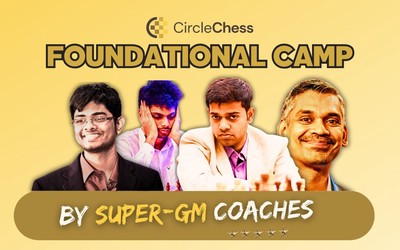
The path to ELO 2000 - a Brief Overview
Achieving a FIDE classical rating of 2000 is a significant milestone in a chess player's journey, marking proficiency and dedication in the game. Many people come closer to this and again fall down and fail to raise their bars again over here and in longer run, they fail to become the Professional Chess Players.Welcome to blog #3 of series - Blog Series : Your Way to ELO 2000.
Achieving a FIDE classical rating of 2000 is a significant milestone in a chess player's journey, marking proficiency and dedication in the game. Many people come closer to this and again fall down and fail to raise their bars again over here and in longer run, they fail to become the Professional Chess Players. In this blog, we will discuss several key areas in brief going further, each factor will be discussed in detail in upcoming blogs! Stay tuned....!
*This blog is written in consideration of the fact that the reader knows basics of chess *
1. Study Plan & Reference Books
- In order to prepare for FIDE Rating of 2000, you shall have a concrete study plan and start reading reference books instead of just doing opening preparation from databases.
The best practice of doing the study of any book is to do it three times in half of the time of first try! - Yasser Seirawan
- There are several series of books which we can recommend to begin with for self taught chess players but we recommend to take insights from your friends / coaches about those books depending upon your strength and the playing style.
- Learn Chess the Right Way - a Series of 5 Books by GM Susan Polgar
-
- Learn Chess the Right Way!: Book 1: Must-know Checkmates
-
- Learn Chess the Right Way: Book 2: Winning Material
-
- Learn Chess the Right Way: Book 3: Mastering Defensive Techniques
-
- Learn Chess the Right Way: Learn Chess the Right Way: Book 4: Sacrifice to Win!
-
- Learn Chess the Right Way, Book 5: Finding Winning Moves: Book 5: Finding Winning Moves!
-
- Winning Chess Series - 7 Books- Yasser Seirawan
-
- Play Winning Chess
-
- Winning Chess Tactics
-
- Winning Chess Strategies
-
- Winning Chess Brilliancies
-
- Winning Chess Openings
-
- Winning Chess Endings
-
- Winning Chess Combinations
-
- Yusupov Series of Books :
-
- Build up your Chess 1
-
- Boost up your Chess1
-
- Chess Evolution 1
-
- Revision and Exam 1
-
- Build up your Chess 2
-
- Boost up your Chess2
-
- Chess Evolution 2
-
- Build up your Chess 3
-
- Boost up your Chess 3
-
- Chess Evolution 3
-
Apart from above mentioned books, there are lot more books available by various authors and publishers. You can select the books as per your liking but we highly recommend to go through these books at least once in a while. It will surely help you to pump up your rating.
2. Study Chess Classics
- Studying classic chess games is like exploring the foundational texts of a field for aspiring scholars.
- These timeless matches played by chess legends are invaluable educational resources for players at all levels. By delving into the strategic brilliance and tactical finesse on display, players gain a deeper grasp of key chess principles like piece placement, pawn structures, manoeuvring, and endgame technique. Moreover, studying classics cultivates an appreciation for the history of chess strategy and contributes to developing one's own unique style and creativity.
- By immersing themselves in the masterpieces of the past, chess players enhance their analytical skills and find inspiration and insight to fuel their growth and progression toward mastery.
3. Play Regularly and Analyze Games
- You need Participate in tournaments to gain practical experience and exposure to various playing styles.
- Analyze games, especially losses, to identify weaknesses and areas for areas of improvement. You shall Seek feedback from stronger players or coaches.
4. Work on Strategic Understanding
- Develop a deeper understanding of strategic concepts such as pawn structure, piece activity, and strategic planning.
-Study games of positional masters to grasp strategic nuances and positional play.
5. Build a Repertoire of Tactical and Strategic Themes
- You need to Develop a repertoire of tactical motifs and strategic themes that can be employed in different types of positions.
- You need to be Familiarized with common plans and ideas associated with specific pawn structures and piece configurations.
6. Maintaining Mental and Physical Fitness
- Stay mentally sharp by engaging in activities that promote cognitive health, such as puzzles, reading, and mental exercises.
- Maintain physical fitness to endure the mental demands of long games and tournaments.
7. Seeking Guidance from Coaches and Mentors
Apart from all above mentioned points, one shall always consult senior players or coaches on what improvements shall be made in the preparation and execution over the board.
8. Stay Patient and Persistent
- Progress in chess is gradual, and setbacks are inevitable. Stay patient and persevere through challenging times.
- Set realistic goals and celebrate small achievements along the way.
- Persistence in preparation and performance is they key to success!
By focusing on these aspects of improvement, a chess player can steadily progress toward achieving a FIDE classical rating of 2000 and beyond. It requires dedication, continuous learning, and a passion for the game.
More blog posts by CircleChessTeam

CircleChess Foundational Learning Series - By SuperGM Coaches
Join CircleChess's June live online chess lessons! Learn chess game online with top coaches. Limited…
Chess Players' Journey - Novice to Advanced Beginner
Chess, among all other games, is known for its intricacy of combining tactics and strategies with ps…
Foundational Camp by SuperGM Coaches
Foundational Camp by SuperGM Coaches